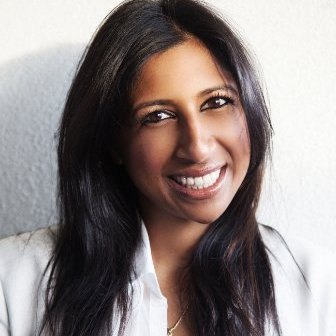
This interview is part of our #WorkBiggerStories series.
Have you ever thought about pursuing work you love, but the job was for lower pay?
Tiffany Kumar, Global Head of Songwriter Relations at Spotify, took this type of risk. Tiffany jumped into the music industry because she loved it. A job with lower pay didn’t hold her back (despite family and friends expressing concern).
She interned for Kanye West before he was Kanye. (Even if you’re not a fan, that’s pretty cool!) And following that experience were several days, months, years struggling as a songwriter in New York City.
What kept Tiffany going? And, how did she get to where she is today, a leader at Spotify running a new department? Read my interview with Tiffany, and learn more about she thought bigger than a paycheck.
Interview with Tiffany Kumar on Why it’s Ok to Take a Job with Lower Pay
Give us some background. Where are you from, and where did you grow up?
My parents were born in India, and I’m from Lincoln, MA. Paul Revere rode through my town!
Lincoln is a very small town so the entertainment industry felt very far away. I moved to New York and attended New York University, which was a game changer for me. That move was critical to my career direction.
Can you think back to when you were 22? Tell us about your first job after NYU and where you started out.
When I moved to New York, I wanted to spend my time working towards something bigger than just paying bills and earning extra cash.
Through NYU, I applied for an internship to help build the record label of then unknown artist Kanye West. I was looking to make friends and see what the music industry was all about. At that time, I had no idea that was the beginning of a long journey in the music industry.
I spent a lot of time in the studio watching Kanye and his artists, and I was inspired. The idea of earning royalties for songwriting was so cool; I could make money while sleeping. So I stepped out on a ledge, and declared myself a songwriter.
“I stepped out on a ledge, and declared myself a songwriter” – Tweet It!
That’s extremely brave at such a young age. What was next?
I spent my days as a struggling songwriter in New York City. I spent countless hours learning to record, getting other musicians and songwriters to collaborate with me, and sitting in any studio where I was allowed to observe.
There was a lot of skepticism from friends and family because it appeared I was graduating from college and “wasting my degree.” But, I slept, ate and breathed songwriting. I eventually wrote songs for the artists on Diddy’s MTV show Making The Band, and I signed a publishing deal with Universal Music Publishing.
Now this brings me to your mission. What is your mission, the work you want to do?
My time as a music publisher felt like home. Now, my role at Spotify as Global Head of Songwriter Relations feels like the natural next step after being a publisher.
No matter what hat I’ve worn, I’ve always believed that the songwriters are the nucleus of the music industry. I’ve made it my mission to stay close to that philosophy.
Did you struggle to identify it?
I followed my passion each step of the way, and that’s what guided me, no matter what I had to sacrifice or how impossible it seemed.
I didn’t realize my mission until I started reflecting during periods of transition. I was naturally working towards a larger goal but had never identified the common thread through all the roles I’ve had.
Can you recall some of the experiences you had led you to your mission?
My career path has been a zig zag. People don’t climb a ladder anymore. For me, it was about pivoting to what felt right.
After spending so much time in the studio observing Kanye West and John Legend, I began to create songs myself.
After becoming a successful songwriter, I then wanted to work with new writers and sign them to publishing deals.
After music publishing, I wanted to be at the forefront of the music industry embracing streaming technology so I went to Spotify.
It seems like the experiences you followed were all about embracing new challenges, and not letting immediate roadblocks (e.g. taking a job with lower pay in the short term) get in the way. Is that right?
I am never complacent. I always look at the big picture, and I make large strides.
Above all, I maintain my core philosophy – that the songwriters are the nucleus of the music industry, and that guides me.
As you move away from the nucleus you have the publishers, managers, label executives, media platforms and so on. I want to stay close to the songwriters.
What has been the result of doing mission-driven work?
I feel fulfilled, and my creative spirit is satisfied. I believe that the years I spent feeling behind my peers in my early twenties paid off. I now bring a unique perspective and very valuable experience to my current role. I wouldn’t have that if I hadn’t taken chances early on.
What’s the biggest challenge you face, especially when it comes to doing mission-driven work? How do you overcome it?
At the beginning my work was very unstable, and there wasn’t much of a financial reward.
As a songwriter I stayed up all night in the studio and never took a day off. It took a long time for that to pay off in any way financially. If I broke up my pay into hours it probably wasn’t that much.
At the time I didn’t care because I knew I was building something bigger, and I was following my passion. That’s what life’s about.
Many 20 to 30-somethings are still struggling to get clear on the work they want to do. What advice do you have for them?
Don’t give yourself limits or boundaries. I was naïve to how competitive and difficult a career in songwriting and music publishing could be, but I’m glad I had rose-colored glasses at the time because I was fearless and just went for it. I lived my life for me and not to please anybody else.
Follow your passion and think bigger than a paycheck, and the money will come. You don’t have to take a conventional route.
What key lessons have you identified through Tiffany’s experience on lower pay jobs? And what questions do you have for her? Share with us in the comments below (and make sure you click on the box below get notifications so you can see our responses to you)!




Love this story. What it brings to mind for me is just the importance of taking time periodically to sit alone with your thoughts and think “What makes sense to ME? What step do I want to take next, and how do I want to do it?” Otherwise we got lost on the path of doing what MOST people would do next or what would be “accepted” by others/those we care about. Taking time to DREAM, continuosly and passionately.
Hi Sierra! I lovee your insight here. You’re exactly right… Tiffany tapped into what she wanted and what felt right for her, which I believe was key in helping her push forward. Listening to that inner voice is so powerful, and helps block out the noise from others (even from well meaning friends and family). <3
“I stepped out on a ledge and declared myself a songwriter.” That is such a powerful statement. One question I have is– at that point in her life, did she have a collection, notebook full-of, portfolio of songs she had written? Had she already done that work of creating content on her own time or was her role more about nurturing others in songwriting and being an advocate of some sort?
I ask because I am currently in a pivot/transition in my career. Since graduating from Syracuse University, I have dedicated my time to youth and community development, taking on roles as a civic organizer, a teaching artist (spoken word poetry to 4th graders), coordinator of a mentoring program for young men (developing curriculum for middle school and high school boys of color), volunteering for political campaigns (citywide, state level, and federal)…and even started a personal development program for girls which incorporates fashion and civic engagement. I have gained and earned a lot of insight on how things work in local politics, youth development, nonprofits, and urban education. I am ready to rise to another level as an expert in my field.
I want to step on a ledge and declare myself a thought leader for my generation. I guess I am just waiting to jump off that ledge. A lady told me the other day, “you do not wait for other people to say you are a thought leader…You are! So YOU say it”…This why I find Tiffany’s declaration powerful! Please advise.
Hi Nayma! Thanks so much for your comment and for asking this question. I’ve shared your question with Tiffany, and she or I will follow up in regards to her experience. (I am also a Syracuse alum!! GO ORANGE!) It sounds like you have an incredible amount of value to add. What is holding you back from declaring yourself a thought leader? And what area do you want to be a thought leader in specifically? Congrats on all of your accomplishments so far! You should be really proud as none of the work you do is easy. I agree with the lady who says you have to declare it first. Is declared myself a writer a few months ago after starting this blog rather than waiting for someone to give me that title. 🙂 It’s empowering, and I did it based on how I feel – the value I feel I can add through my writing. I say you are more than ready to call yourself a thought leader – especially hearing your story from the outside, and it’s time to make the jump!
And from Tiffany: “My first song was like my child and I edited and edited it for months. Now looking back that song was terrible! I had to write, write, write and spend countless hours in the studio until I had something that was even listable on a professional level. I also had to surround myself with writers and producers that were already placing songs with popular artists. Eventually, I had about 10 great songs and that’s what I played for Diddy.
The nurturing came after I had some success for myself, but it was a role that came naturally for me.”
🙂 Thanks again Nayma!